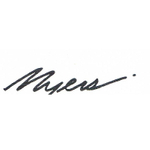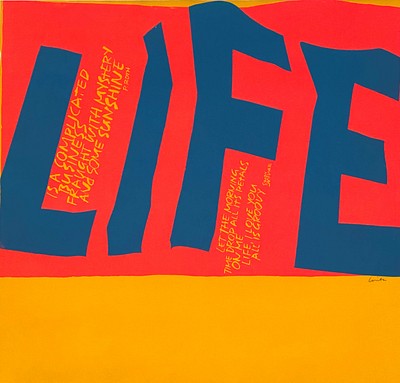Brian Bourke (Irish, 1936-) Self Portrait Painting
Two ways to bid:
- Leave a max absentee bid and the platform will bid on your behalf up to your maximum bid during the live auction.
- Bid live during the auction and your bids will be submitted real-time to the auctioneer.
Bid Increments
| Price | Bid Increment |
|---|---|
| $0 | $10 |
| $100 | $25 |
| $500 | $50 |
| $1,000 | $100 |
| $2,500 | $250 |
| $5,000 | $500 |
| $10,000 | $1,000 |
| $15,000 | $2,500 |
| $50,000 | $5,000 |
| $100,000 | $10,000 |
About Auction
Apr 30, 2023
Fine Art Auction - 35th Anniversary Myers Antiques auctions@myersfineart.com
- Lot Description
Brian Bourke (Irish, 1936- ) Painting. Title - Self Portrait with Two Hats ‘84. Watercolor painting. Signed lower right Brian Bourke ‘67. Inscribed on the reverse, Self Portrait with Two Hats 84. Mr. Harvey 36 Mulberry Close FLA. Sheet size measures 30 inches high, 22 inches wide. Image size 29.5 inches high, 21.5 inches wide. Frame measures 36 inches high, 28 inches wide. In good condition, tape hinged at top, not laid down. From the Watermill, NY estate on Long Island of Academy Award nominated film director Anthony (Tony) Harvey (1930-2017).
From Askart.com: Brian Bourke RHA (1936- ) Renowned for his landscapes and his draftsmanship as well as his series of humorous self-portraits comparing himself to Don Quixote, Brian Bourke was born in Dublin in 1936. He studied at the National College of Art and Design in Dublin, and at St. Martin's School of Art in London. In 1964, he held his first solo exhibition in Dublin. In 1965, he was chosen to represent Ireland in both the Biennale de Paris and the Lugano Exhibition of Graphics. In the same year he won the Arts Council prize for portraiture and then, in 1967, won first prize in the Irish Exhibition of Living Art competition. A regular exhibitor at the Dawson and Taylor Galleries in Dublin, and at art galleries in Switzerland, England and America, his paintings were included in the Delighted Eye, the Hibernian landscape and the Cork Rosc exhibitions in 1980. In 1985, the Sunday Independent newspaper named him Artist of the Year, and in 1993 he received the O'Malley Award from the Irish-American Cultural Institute. In 1991, he was appointed artist-in-residence at the Beckett Festival in the Gate Theatre, Dublin, while his accompanying works appeared at the Douglas Hyde Gallery. In 2001, a large exhibition of his portraits of women, centered around portraits of his son's adopted daughter, appeared at the Dyehouse Gallery in Waterford. He lives in County Galway. Brian Bourke's paintings appear in many important collections throughout Ireland and worldwide. He is an elected member of Aosdana, one of Ireland's most eminent art organizations.
Obituary from NY Times - Dec. 13, 2017: Anthony Harvey, Lion in Winter - Director and Kubrick Editor, Dies at 87.
It might have gone down as the most ridiculous scene in the most audacious film that Anthony Harvey ever worked on, but at least as Mr. Harvey told the story, a momentous event in the real world kept it from the moviegoing public. It was an epic two minutes worth of pie throwing, and it was originally to be the ending of - Dr. Strangelove or: How I Learned to Stop Worrying and Love the Bomb, - Stanley Kubrick's dark satire of the nuclear age. Mr. Harvey, the editor on that movie, was pretty pleased with the way the chaotic scene had come out. It was a brilliant piece of work, he once said. Who knows? I certainly thought it was. But the movie, which was scheduled for release in January 1964, was to receive its press premiere in late November 1963, right when all sorts of plans were thrown into turmoil by the assassination of President John F. Kennedy. That ending, how it started, the George Scott character threw a custard pie to the Russian ambassador, and it missed and hit the president, Mr. Harvey told the film journalist Glenn Kenny in 2009. Columbia Pictures, he said, was very nervous about anything to show the president, any president in that state. As a result, the pie-throwing scene was scrapped. Others involved with the movie have over the years given different explanations for the changed ending, but in any case the airborne pies were replaced with the now familiar montage of nuclear explosions - set to Vera Lynn's rendition of the song We'll Meet Again, an unsettling ending instead of a slapstick one. Mr. Harvey would go on to become a director himself, teaming with Katharine Hepburn on several films, most notably The Lion in Winter (1968), for which he was nominated for an Oscar. He died on Nov. 23 at his home in Water Mill, on Long Island, at age 87. The Brockett Funeral Home confirmed the death. Mr. Harvey was born on June 3, 1930, in London. His father, Geoffrey Harrison, died when he was young, and after his mother, the former Dorothy Leon, remarried, he took the surname of his stepfather, Morris Harvey, an actor. He got an early taste of the movie business when he was cast in a small part in the 1945 film "Caesar and Cleopatra," which starred Claude Rains and Vivien Leigh, but his real entree came when he landed a job as an editor for the British filmmakers John and Roy Boulting. He learned the art of editing as it was done in predigital days, pasting countless film clips together by hand. He received his first film-editor credits in 1956, on a short called - On Such a Night and the feature Private's Progress, a war comedy. He was the editor on Kubrick's - Lolita in 1962, which led to the - Dr. Strangelove assignment, a difficult one that involved cutting between three concurrent story lines, one set in the war room of the American government. We had a huge kind of war room of our own in the cutting room, Mr. Harvey told Mr. Kenny, and we put up pieces of paper representing every sequence in different order. It was Kubrick, he said in a 1994 interview with The New York Times, who told Mr. Harvey that he was ready to direct. It was Kubrick, too, who gave him an important piece of advice: If an actor is giving a dazzling performance, hold on to that shot and resist the temptation to cut away to, for instance, the reactions of other characters in the scene. In 1966, Mr. Harvey directed - Dutchman, a short film based on a play by LeRoi Jones, who would become better known as Amiri Baraka. Peter O'Toole was impressed enough by that film that he recruited Mr. Harvey for - The Lion in Winter, in which Mr. O'Toole starred as Henry II opposite Katharine Hepburn as Eleanor of Aquitaine. Working with her is like going to Paris at the age of 17 and finding everything is the way you thought it would be, Mr. Harvey said. Hepburn won an Oscar for her performance, splitting the award with Barbra Streisand, who won for Funny Girl. Mr. Harvey also directed Hepburn in a well-regarded television adaptation of Tennessee William's - The Glass Menagerie in 1973. John J. O'Connor, reviewing that film in The Times, called it a special TV event, demanding attention. It won four Emmy Awards. But Mr. Harvey's output as a director was limited. His handful of theatrical releases included the comedy - They Might Be Giants in 1971, the drama Richard's Things in 1981 and another Hepburn vehicle, Grace Quigley, in 1985. That movie was poorly received, and Mr. Harvey retreated from film directing, returning only in 1994 for This Can't Be Love, a television movie starring Hepburn and Anthony Quinn. He retired to his Long Island home, which he had acquired three years earlier. He leaves no immediate survivors. Mr. Harvey was comfortable working in Hollywood but preferred life on the East Coast, where the film business was not quite so all-consuming. He told of once having surgery in a Los Angeles hospital. As I was coming to, he recalled, the anesthesiologist said, - I'm very anxious to get into movies. - Shipping Info
-
All shipping arrangements and costs are the sole responsibility of the buyer. We are happy to assist in the transfer of merchandise to a shipper of your choice. Buyers should request a shipping quote prior to bidding. There are reliable shipping companies to use, and they include:
(1) The UPS Store:
Charlie Mosher
301 West Platt St
Tampa, FL 33606
(813) 251-9593
store3751@theupsstore.com
www.theupsstore.com/3751For a shipping quote, click the link below to get started on a quote OR to make payment for an existing quote: MyAuctionQuote.com/myers
(2) The UPS Store:
RayAnna Brodzinski
740 4th Street North
St. Petersburg, FL 33701
(727) 513-2400
shipping@store6886.com
www.theupsstore.com/6886(3) The UPS Store:
Rian Fehrman
5447 Haines Rd N,
St. Petersburg, FL 33714
(727) 528-7777
store6173@theuspsstore.com
www.theupsstorelocal.com/6173(4) Family Pak & Ship
Amel & Mohamed Hamda
2822 54th Avenue S.
St. Petersburg, FL 33712
727 865-2320
Raman@familypakandship.com
www.familypakandship.com(5) The UPS Store:
Gina Farnsworth
204 37th Ave N.
St Petersburg, FL 33704
(727) 822-5823
store3146@theupsstore.com
www.theupsstore.com/3146(6) The UPS Store:
200 2nd Ave South
St Petersburg, FL 33701
(727) 826-6075
store3248@theupsstore.com
www.theupsstore.com/3248(7) Craters & Freighters
(813) 889-9008
Fax (813) 884-8393
Tampa@cratersandfrighters.com
www.cratersandfreighterstampa.com (U.S. & International)(8) Orbit Professional Packing Crating
(888) 247-8540 or (727) 507-7447
lg@orbitppc.com
www.orbitppc.com (U.S. & International)LARGER ITEMS SHIPPING SUGGESTIONS
For items too large for standard shipping, such as furniture:
(1) Plycon - Furniture Transportation Specialists"
(954) 978-2000 (U.S. only)
lisa@plycongroup.com
www.plyconvanlines.com
You must submit a request on-line.(2) All Directions Moving
Specialist in moving furniture from FL to NY.
941-758-3800
alldirections@comcast.net
(3) Craters & Freighters
(813) 889-9008 or (877) 448-7447
Tampa@cratersandfreighters.com
(U.S. & International).(4) Westbrook Moving LLC
Makes regular trips up and down the east coast.
(404) 877-2870
westbrookdeliveries@gmail.com(5) Eastern Express
Owner Jeff Bills makes regular trips up and down the east coast.
(843) 557-6633
jb101263@yahoo.com(6) Can Ship US
Owner makes trips from Florida to Canada
Steve Fleury (905) 301-4866
canshipus@gmail.comThere are many other local and national shippers available in our area that we can refer you to. We are not responsible for any delays on the part of this third party shipper, should there be any. We recommend shipping all items insured. Should any damage occur to items transported by a third party, we are not held responsible. In the event that an item is approved for a return, shipping is not refundable.
-
- Buyer's Premium



 EUR
EUR CAD
CAD AUD
AUD GBP
GBP MXN
MXN HKD
HKD CNY
CNY MYR
MYR SEK
SEK SGD
SGD CHF
CHF THB
THB





















